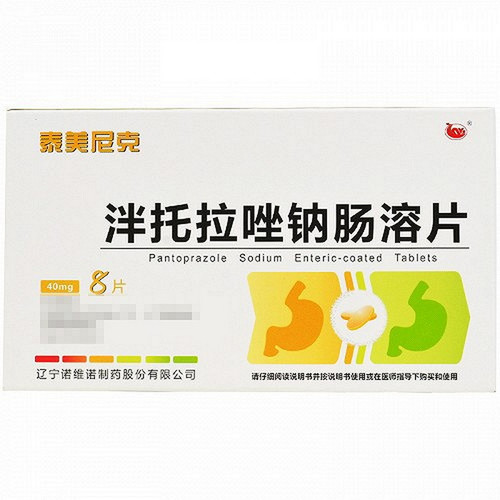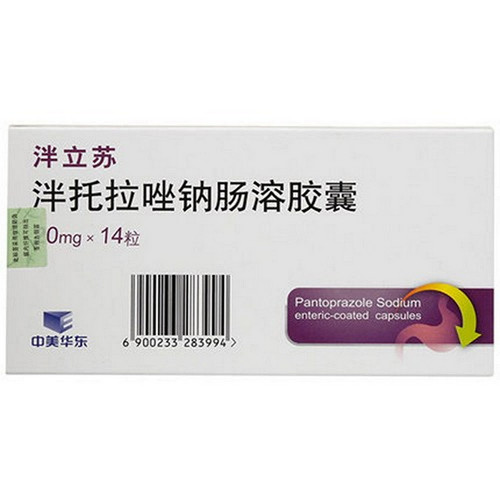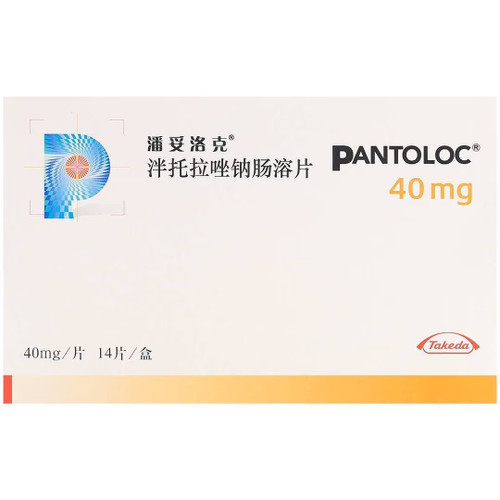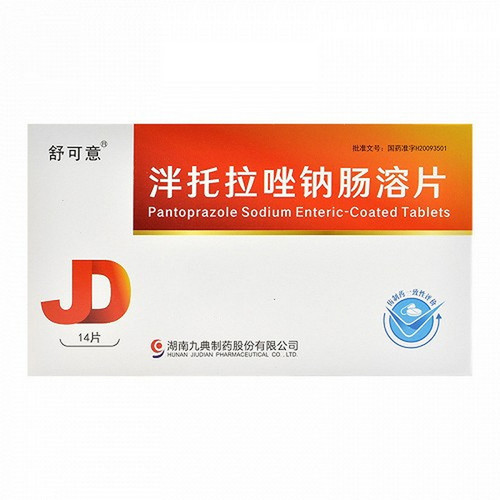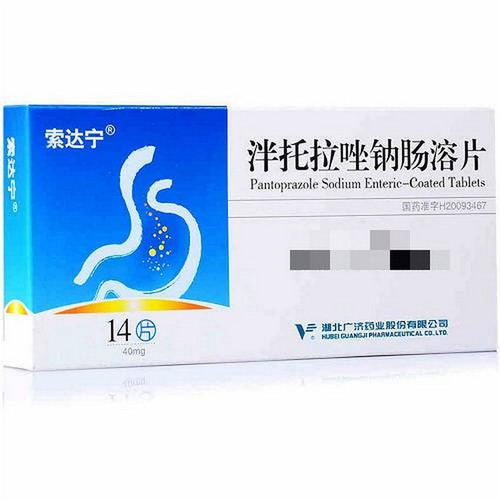Product Overview
[Drug Name]
Trade Name: Taimenic
English Name: Pantoprazole Sodium Enteric-coated Tablets
Chinese Pinyin: Pantuolazuona Changrongpian
[Ingredients]
The main ingredient of this product is pantoprazole sodium.
[Properties]
This product is a reddish-brown enteric-coated film-coated tablet. After removing the film, it appears white.
[Indications]
It is indicated for active peptic ulcers (gastric and duodenal ulcers), reflux esophagitis, and Zollinger-Ellison syndrome.
[Dosage and Administration]
Oral administration: 40 mg (1 tablet) daily before meals. The treatment course for duodenal ulcers is usually 2-4 weeks, while the treatment course for gastric ulcers and reflux esophagitis is usually 4-6 weeks.
[Adverse Reactions]
Dizziness, insomnia, drowsiness, nausea, diarrhea and constipation, rash, and muscle pain may occur occasionally during clinical use.
[Contraindications]
This product is contraindicated in breastfeeding women and women within three months of pregnancy.
[Precautions]
1. High doses may cause arrhythmia, elevated transaminases, changes in renal function, and decreased granulocytes. 2. This product is an enteric-coated formulation and should not be chewed.
3. When gastric ulcers are suspected, the possibility of cancer should be ruled out first. This is because treatment with this product may alleviate symptoms and delay diagnosis.
4. Efficacy and safety data for this product in children have not been established.
5. Use with caution in patients with hepatic and renal impairment.
[Use in Special Populations]
Precautions for Children:
There is currently no experience with its use in children.
Precautions for Pregnancy and Lactation:
Clinical experience with this drug in pregnant women is limited. In animal studies, mild fetal toxicity has been observed at doses above 5 mg/kg. There is no data demonstrating that pantoprazole enters human breast milk. Its use should only be considered when the benefits to the mother outweigh the potential risks to the fetus or infant.
Precautions for Elderly:
No dosage adjustment is required for elderly patients.
[Drug Interactions]
When coadministered with drugs whose bioavailability depends on pH (such as ketoconazole), the effect of these drugs on their absorption should be considered. Pantoprazole is metabolized in the liver by the cytochrome P450 enzyme system, so interactions with other drugs metabolized by this enzyme system cannot be ruled out. However, clinical testing of many such drugs, such as carbamazepine, caffeine, diazepam, diclofenac, digoxin, ethanol, glyburide, metoprolol, nifedipine, phenprocoumon, phenytoin, theophylline, warfarin, and oral contraceptives, has not observed interactions between pantoprazole and antacids.
[Pharmacological Actions]
Pantoprazole is a proton pump inhibitor that covalently binds to two sites in the H+-K+ ATPase system of gastric parietal cells, inhibiting the final step in gastric acid production. This effect is dose-dependent and inhibits both basal and stimulated gastric acid secretion. Binding of this product to the H+-K+ ATPase results in an anti-gastric acid secretory effect that persists for more than 24 hours. Genotoxicity: Pantoprazole was positive in the human lymphocyte chromosome aberration assay, the Chinese hamster ovary cell/Hg PRT forward mutation assay, and the secondary mouse micronucleus assay, while the rat liver DNA covalent binding assay was indeterminate. The Ames rat hepatocyte unscheduled DNA synthesis assay (UDS), the AS52/g PT mammalian cell forward gene mutation assay, the mouse lymphoma L5178Y cell thymidine kinase mutation assay, and the in vivo rat bone marrow chromosome aberration assay were all negative. Reproductive toxicity: No significant changes in fertility or reproductive behavior were observed in male rats orally administered pantoprazole at a dose of 500 mg/kg/day (approximately 98 times the recommended clinical oral dose based on body surface area) and in female rats at a dose of 450 mg/kg/day (approximately 88 times the recommended clinical oral dose). Oral administration of pantoprazole at 450 mg/kg/day (approximately 88 times the recommended clinical oral dose) to female rats and 40 mg/kg/day (approximately 16 times the recommended clinical oral dose) to rabbits resulted in significant impairment of fertility and fetal development. Pantoprazole and its metabolites are secreted into rabbit milk. Carcinogenicity: Oral administration of pantoprazole at 0.5-200 mg/kg/day for 24 months (based on a body surface area conversion of 40 mg/day for a 50 kg human, resulting in exposure doses 0.1-40 times the human dose) to SD rats resulted in dose-dependent enterochromaffin-like cell hyperplasia and benign and malignant neuroendocrine cell tumors in the gastric fundus. At doses of 50 and 200 mg/kg/day (approximately 10 and 40 times the recommended clinical oral dose), benign squamous cell papillomas and malignant squamous cell carcinomas developed in the forestomach. Pantoprazole has also caused rare gastrointestinal tumors in rats, including occasional benign polyps and adenocarcinomas at a dose of 50 mg/kg/day. Pantoprazole doses of 0.5-200 mg/kg/day also resulted in a dose-dependent development of hepatocellular adenomas and hepatocarcinomas in rats, and a dose of 200 mg/kg/day increased the incidence of thyroid cystic cell tumors and cystic cell carcinomas in rats. Hepatocellular adenomas and hepatocarcinomas were also occasionally observed in 6- and 12-month toxicity studies in SD rats. B6C3F1 mice administered pantoprazole orally at 5-150 mg/kg/day (0.1-15 times the recommended clinical oral dose based on body surface area) for 24 months also developed enterochromaffin-like cell hyperplasia in the gastric fundus; female rats showed an increased incidence of hepatocellular adenomas and hepatocarcinomas at a dose of 150 mg/kg/day. The results of the rodent carcinogenicity study above indicate that this product is carcinogenic, but the clinical relevance of this result is unclear.
[Storage]
Store in a cool, dark place, sealed and protected from light.
[Strength]
20 mg
[Packaging]
14 tablets/box
[Expiry Life]
24 months
[Approval Number]
National Medicine Standard H20059067
[Manufacturer]
Company Name: Liaoning Novino Pharmaceutical Co., Ltd.




